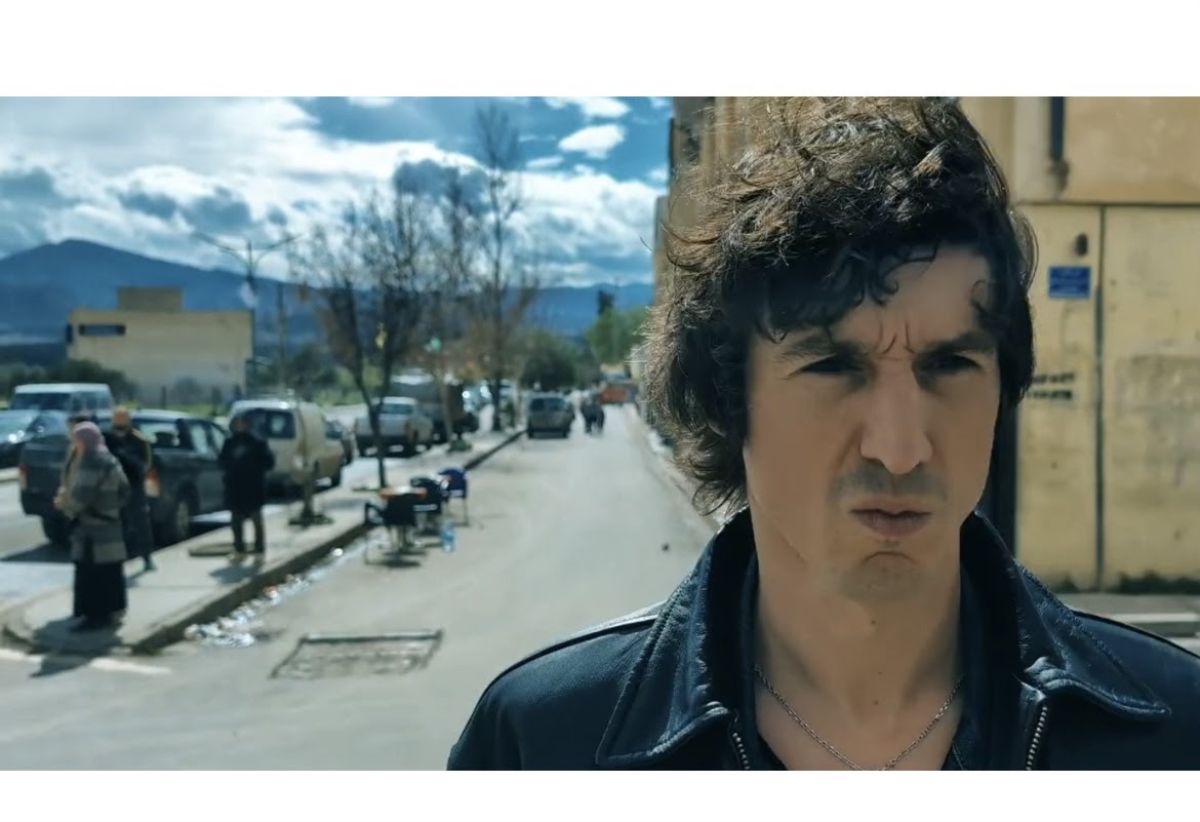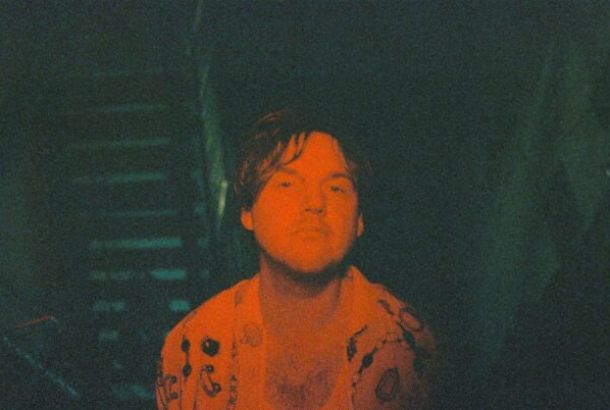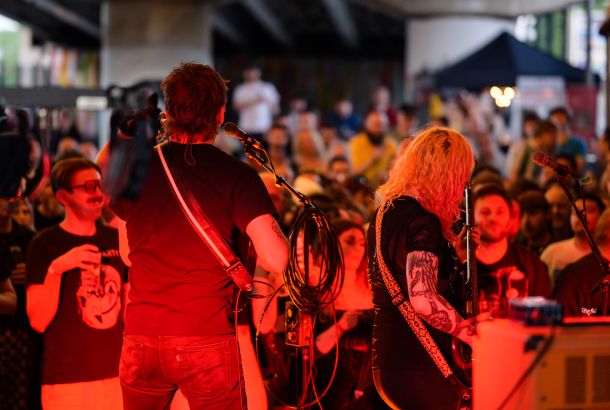Fat White Family’s Lias Saoudi is circling around the Post-Punk cul-de-sac

On an unassuming Wednesday afternoon, fresh off the back of the European leg of their Forgiveness Is Yours album tour, I was granted the chance to convene with the Fat White Family’s fascinating frontman.
Lias Saoudi, green tea in hand, began amiably. He apologised for being slightly late, mumbling about the work going on outside his Brixton flat. “People are never done with their houses, do you know what I mean?… You rent a flat in a decent bit of town, and you think you’ll have a bit of peace and quiet. […] It’s these young professionals and their fucking upgrades.” The tone was set, and instantly there was a common ground. I’m not a fan of Yuppies either.
Lias Saoudi as a character has origins that are tricky to place. Born an Algerian father and a Yorkshire mother, he spent time living in Scotland and Northern Ireland before eventually landing a place at the Slade. Despite this, Saoudi considers himself a Londoner, and by extension, considers the Fats a London band.
“I feel like South London is as much my place as any other place is. I’ve been in London for 20 years now… South London is very specific… it doesn’t feel so much like a city, more so a conglomeration of villages and towns. It doesn’t feel like Paris or Berlin or New York, you know when you’re in the city.”
It seems to be that as the recent Post-Punk wave is approaching peak saturation, Brixton’s cult venue The Windmill is on the tip of everyone’s tongues. Black Country New Road, Black Midi, and Shame, just to name a few, are artists whose identities have been moulded by that place, and Fat White Family are no different. Saoudi’s outlook was characteristically pessimistic.
“I think a scene oversaturates itself, and then you have a situation where the off-the-beaten-path allure gets replaced by a legit, industry fixation, where A&R men go shopping. Which is not how I remember it back in the day… But I mean, it’s full all the time. There’s always stuff going on there, which is cool.”
He spoke fondly of Fat Dog, Sorry, and Dead Letter, all of whom he seems to see round and about. However, his honesty remained clear. “I mean I’m not really all that clued into what’s going on, to be honest, you know? Since I stopped getting sourced all the time, I really go out a lot less.”
The conversation quickly turned from what he hadn’t been listening to, to what he had. On tour, Saoudi’s listening habits were expectedly eclectic. “I was listening to Rothko Chapel. Martin Feldman. He’s a minimal composer. That was interesting. I was listening to some Chet Baker on the road, a little bit of jazz… I think I need to start collecting records… Spotify has diminished my attention span, I think.”
The green, streaming giant – the elephant in the room – was never going to stay dormant for too long in a conversation like this. Saoudi’s opinions on the state of modern music occasionally precede him. Quiet about his opinions he is not, which can only be a good thing. “It’s death by convenience,” he said, referring to my comment about Spotify uncovering the odd gem. “It just cheapens everything.”
Spotify CEO Daniel Ek is a somewhat symbolic figure to Saoudi. “I think it’s pretty fucking grotesque the stuff that that guy [Daniel Ek] comes out with. You know, he’s a bit like the musical equivalent of that guy that runs Ryanair [Michael O’Leary]… It’s like, oh, yeah, we’re just gonna demonetize the first 1000 streams. How can that be legal? How can you make that decision? As a corporate overlord [to] just be, yeah, we’ve decided that you guys right at the bottom who were getting basically nothing, now, you just get nothing.”
Since their last LP Serfs Up!, Fat White Family have been through a whole lot of change. Tooth-gapped creative dynamo Saul Adamczewski has left, re-joined, and now seems to have left for good, and Saoudi’s brother, the band’s keyboardist Nathan Saoudi, has not been joining them for the tour thus far.
The band have always been tumultuous. The definition of unstable. But it seems that the recording process of Forgiveness Is Yours was another struggle. “I think with this record, it was made in a state of perpetual crisis. I mean, they all were. This one was especially. Your backs are up against the wall a little bit. It wasn’t like there was time to sort of meditate on the process or whatever. It was just rolling with the punches.”
Saoudi’s description of Fat White Family’s most recent recording process speaks for itself – a belligerent, painful task. Released last year, Saoudi’s warts-and-all biography of the band Ten Thousand Apologies seemed all the more necessary – a release from the chaos of being in a rock’n’roll band in the 21st Century.
In recent years, Saoudi has turned his hand more and more towards literature, and on this, he remarked: “I feel like it’s a necessity. I think, for me, it’s just a way of completing things … an experience is even more of an experience once you’ve written about it, and it’s a way of learning about all kinds of shit. If you don’t really know about something, a great way to learn about it is to just write an essay about it.”
His essays concern all manner of things, but chief among them remains Saoudi’s staunchly political sensibilities. One of the brilliant things about the Fat White Family is their unashamed class politics. Hitting at this point, we were approaching Saoudi’s enflamed best – a raw passion that cannot be emulated. “I think we’ve reached the point now where it’s unabashedly posh, you know, where it’s luridly posh, you know. Like, what’s that band? The Last Dinner Party, you know. I actually found that almost reassuring because it was, at least they’re not even remotely trying to hide it. They’re just, ‘We’re screamingly fucking posh, and we’re having a great time’.”
Saoudi’s opinions on the industry could fill its own collection of essays. On this Wednesday afternoon, Saoudi was approaching top form though. “There’s no money. There’s no nothing. It’s dying right now. It’s like the fucking people despise the proles. It’s such class hatred in this fucking country… always active, venomous, disgust towards anybody that wanders from liberal shibboleths and middle-class sensibilities. In actual fact, the knives are always fucking out.”
“What gave the medium its urgency and vitality was the commingling of different kinds of social elements. It was a mixture of up and down the spectrum.”
It seems as though fewer and fewer artists have the want to attack issues with such venom and tenacity as Saoudi does. On asking him about who of his peers he thought had a good couplet in them, he said: “I like Baxter [Dury]. I think he delivers sometimes. I like that last album that was all about being a Nepo baby… [Sleaford Mods] had the odd really good [lyric]… They had the one about “the smell of piss is so strong it smells like decent bacon”, you know. I think so long as there’s a few decent couplets, or even one or two, there’s enough there to legitimize the act.”
He tried, hard, to think of more compliments to give, but he isn’t one for hiding from his own, stubborn truths. “I don’t know whether that’s because it’s actually dogshit or whether because I’m like, pathologically competitive, but I have to see dogshit everywhere to support my own narcissistic defence mechanism. You know, so I can’t be trusted to give you a legitimate opinion on that. But generally speaking, there isn’t like a Mark E. Smith kicking around, is there.”
For Saoudi, The Fall represent Post-Punk in its unfiltered glory – what the genre should be. “I just think he is rubbing the detritus of his pockets in your face, Mark E. Smith… It’s unpleasant, it’s claustrophobic… I think we live in a period… It’s sort of genre-wise… so plastic. Everything’s within reach, and has already happened… I mean, what isn’t Post-Punk? Post-Punk happened in the late 70s. And then everything after that is, I suppose, by definition, Post-Punk.”
Ever one for a turn of phrase, Saoudi continued: “Did you read Mark Fisher’s writing about Post-Punk? The post-post-post-punk and this lock that people are stuck in. This rehash of this moment of urgency or whatever…. We do seem to have wound up in a Post-Punk cul-de-sac.”
“We’ve been in the Post-Punk cul-de-sac now, for what feels like, 10 years. Where it’s like, angular guitars. People sort of speaking, or shouting in their colloquial accents … there are obvious culprits there. And some of these bands are okay, some of them are fucking terrible. It just seems to be that that’s where we’re at, and that’s ‘authenticity’, you know?”
Today’s Post-Punk evidently has no effect on Saoudi. “It’s just this, washed out, banal, toothless, twee mimicry of this idea we had, but it doesn’t get the core of the matter.”
“Everything now is so considerate. There’s this cult of nicety. Everyone has to be extra careful, and extra considerate and extra friendly. Extra empathetic.”
I had seemed to coax the true contrarian out of the man before me. “It’s like comments threads. Fuck comments threads! Who the fuck? What gives you the right to besmirch other peoples’ creative acts with your puny opinions? They just dab the world with their shit. It lowers everything to just the lowest common denominator. I think comment threads have just destroyed democracy as an idea, you know? I think that’s it. It’s finished. That idea, that everyone should have their say, is dead in the water, you know?” He began to laugh whilst speaking. “And there’s hard proof now. Everybody gets their say, and what do you get?”
With that, democracy was pronounced dead, and alongside it lay the future of rock’n’roll. For all of his bite and scathing wit, beneath was a true genius. The Fat White Family may once again be in a state of crisis, but like all things honest, they are necessary.







